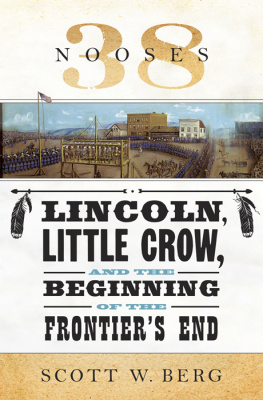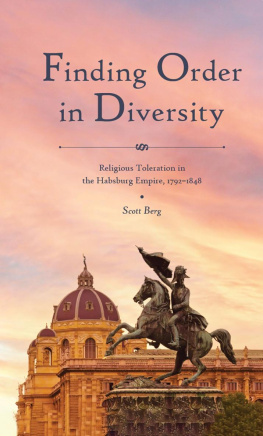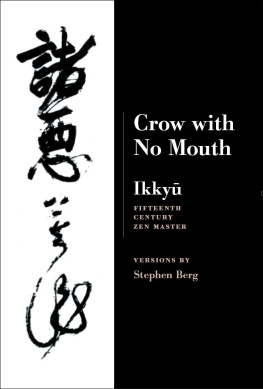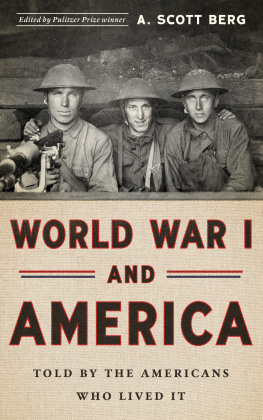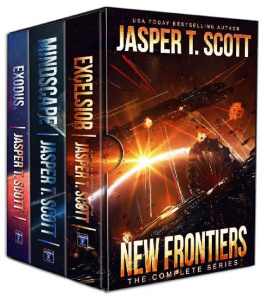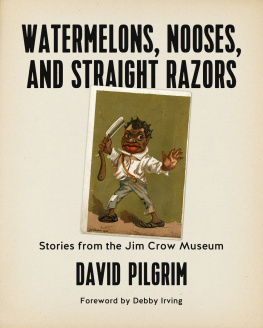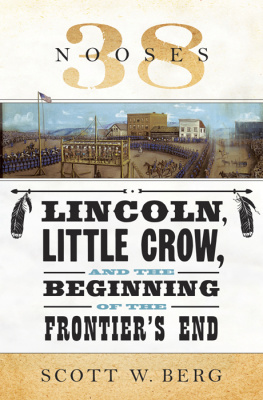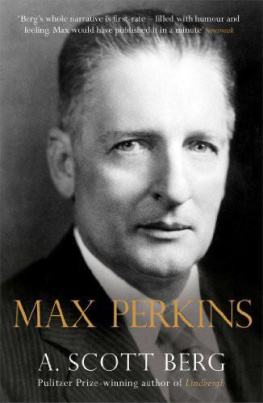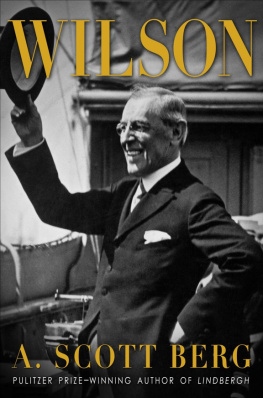Scott W. Berg - 38 Nooses: Lincoln, Little Crow, and the Beginning of the Frontiers End
Here you can read online Scott W. Berg - 38 Nooses: Lincoln, Little Crow, and the Beginning of the Frontiers End full text of the book (entire story) in english for free. Download pdf and epub, get meaning, cover and reviews about this ebook. year: 2012, publisher: Knopf Doubleday Publishing Group, genre: Politics. Description of the work, (preface) as well as reviews are available. Best literature library LitArk.com created for fans of good reading and offers a wide selection of genres:
Romance novel
Science fiction
Adventure
Detective
Science
History
Home and family
Prose
Art
Politics
Computer
Non-fiction
Religion
Business
Children
Humor
Choose a favorite category and find really read worthwhile books. Enjoy immersion in the world of imagination, feel the emotions of the characters or learn something new for yourself, make an fascinating discovery.
- Book:38 Nooses: Lincoln, Little Crow, and the Beginning of the Frontiers End
- Author:
- Publisher:Knopf Doubleday Publishing Group
- Genre:
- Year:2012
- Rating:5 / 5
- Favourites:Add to favourites
- Your mark:
- 100
- 1
- 2
- 3
- 4
- 5
38 Nooses: Lincoln, Little Crow, and the Beginning of the Frontiers End: summary, description and annotation
We offer to read an annotation, description, summary or preface (depends on what the author of the book "38 Nooses: Lincoln, Little Crow, and the Beginning of the Frontiers End" wrote himself). If you haven't found the necessary information about the book — write in the comments, we will try to find it.
Scott W. Berg: author's other books
Who wrote 38 Nooses: Lincoln, Little Crow, and the Beginning of the Frontiers End? Find out the surname, the name of the author of the book and a list of all author's works by series.
38 Nooses: Lincoln, Little Crow, and the Beginning of the Frontiers End — read online for free the complete book (whole text) full work
Below is the text of the book, divided by pages. System saving the place of the last page read, allows you to conveniently read the book "38 Nooses: Lincoln, Little Crow, and the Beginning of the Frontiers End" online for free, without having to search again every time where you left off. Put a bookmark, and you can go to the page where you finished reading at any time.
Font size:
Interval:
Bookmark:
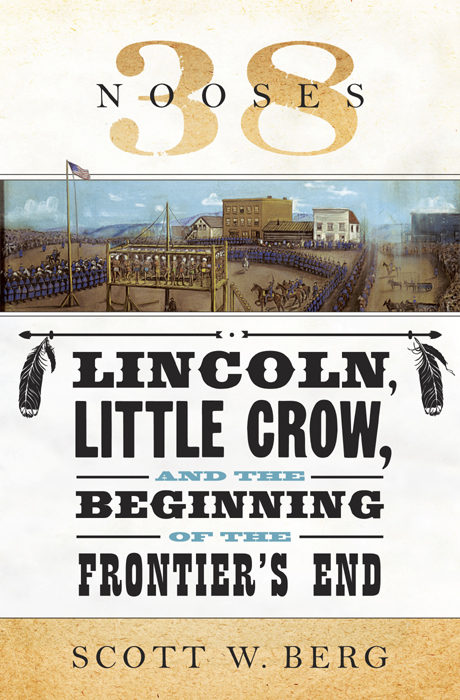
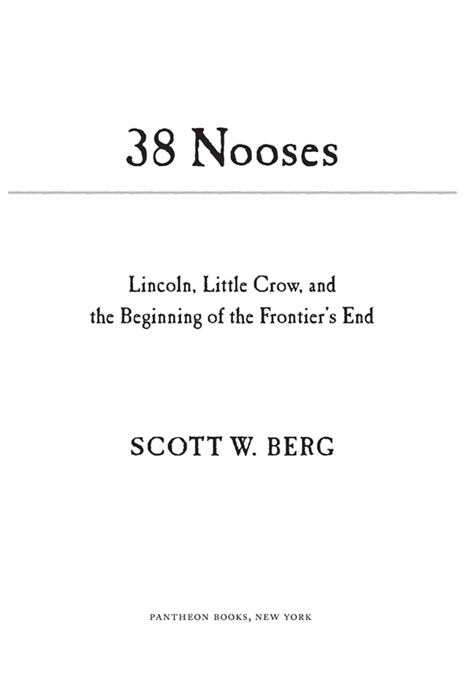

Copyright 2012 by Scott W. Berg
All rights reserved. Published in the United States by Pantheon Books, a division of Random House, Inc., New York, and in Canada by Random House of Canada Limited, Toronto.
Pantheon Books and colophon are registered trademarks of Random House, Inc.
Library of Congress Cataloging-in-Publication Data
Berg, Scott W.
38 nooses : Lincoln, Little Crow, and the beginning of the frontiers end / Scott W. Berg.
p. cm.
Includes bibliographical references and index.
1. Dakota IndiansWars, 18621865. 2. Lincoln, Abraham, 18091865Relations with Dakota Indians. 3. Little Crow, d. 1863. 4. Dakota IndiansGovernment relationsHistory19th century. 5. Dakota IndiansRelocation. 6. Executions and executionersUnited StatesHistory19th century. I. Title. II. Title: Thirty-eight nooses.
E 83.86. B 47 2012 973.7dc23 2012002807
Illustrations courtesy of Library of Congress
Ebook ISBN9780307907394
Map by Paul Gormont
Cover image: Execution of Dakota Indians, Mankato, Minnesota, 1884, by J. Thullen (detail). Minnesota Historical Society.
Cover design by Brian Barth
www.pantheonbooks.com
v3.1_r1
For Mom and Dad
On the bright May afternoon in 1786 when his family would be shattered and the course of his newborn country forever altered, Mordecai Lincoln was fifteen years old. The Lincolns lived on the frontier in the far western portion of Virginia, a region called Kentucky, most likely from a Wyandot or Iroquoian word meaning land of tomorrow or place of meadows. They were pioneers, and like all pioneers in the Ohio River Valley during the late eighteenth century, they were lucky just to be alive. Four years earlier the Lincoln family had crossed through the Cumberland Gap, following a trail first blazed by Daniel Boone, and today Mordecai and his brothersJosiah, thirteen, and Thomas, eightwere assisting their father as he enclosed a cornfield, working to carve out an ever-larger pocket of civilization on a parcel of land beside Long Run, a branch of a branch of a branch of the Ohio River east of the new settlement of Louisville.
As the boys helped to position the top rail of a new fence, a shot sounded. Their father tumbled to the ground and out of the woods emerged two or three Indians. Mordecai picked up his fathers rifle and barked at Josiah to run as fast as he could to the community stockade called Hughes Station, fifteen minutes distant, to sound the alarm. Josiah ran and so did Mordecai, who reached the cabin his father had built just as he heard his other brother cry out. He turned to see Thomas, grasped by the hair and trousers, being carried toward the tree line. Mordecai required only a moments look, and perhaps not even that, to know that the Indians didnt intend to kill Thomas. They intended to take him. Mordecai leveled his gun and aimed for a sun glint of metal in the late afternoon sun, a half-moon pendant dangling against the chest of his brothers would-be captor. The teenagers aim was remarkable; that, or luck was with him. The Indian went down; his companions vanished; Thomas was unhurt.
Many years later, Thomass son Abraham, risen higher in the world than any member of the Lincoln clan could have ever dared imagine, would call this story the legend more strongly than all others imprinted upon my mind and memory. Abraham Lincoln, namesake of his murdered grandfather, would never say much about his own early years in Kentucky, embarrassed into a lifetime of silence by his familys shiftlessness and poverty. Yet this story, of his grandfather killed by Indians, was told often enough and in enough detail that Lincolns longtime law partner, William Herndon, collecting a books worth of reminiscences of the late president, was able to record no fewer than six versions from four different tellers, all second- and thirdhand accounts tracing back to Thomas or Mordecai.
Like so many pieces of frontier color, the Lincolns tale of death and attempted abduction was the story of westward expansion in miniature, tightly intertwined with breathless assumptions about the savagery of Indians and the march of civilization. For Abraham Lincoln, it was nothing less than the bedrock of the log-cabin posturing that had helped to push him toward the highest office in the land. Owing to my father being left an orphan at the age of six years, in poverty, and in a new country, he wrote in 1848, during his single term as a United States representative, he became a wholly uneducated man; which I suppose is the reason why I know so little of our family history. The future president rued the loss of a childhood spent on his grandfathers trim and ordered farm, and worse yet, the elder Abrahams early death represented an irrecoverable severing from the old Lincoln line and its history of military service, respectable fortune-seeking, and honorable English heritage. Writing in the third person for a campaign autobiography in 1860, framing his personal history for the American electorate, he said, By the early death of his father and very narrow circumstances of his mother, even in childhood [Thomas was] a wandering, laboring boy, and described his own childhood, using a line from Thomas Grays Elegy Written in a Country Church-Yard, as the short and simple annals of the poor. In the same document, Lincoln also presented the death of his grandfather as the wellspring of his lifelong obsession with self-instruction: He regrets his want of education, and does what he can to supply the want.
Had Mordecai not shot so accurately, Thomas would have been carried off into a void. In Thomass and Mordecais tellings, the Indians emerge from that void, are that void. They pop out of the trees and act with the undifferentiating violence of nature, to whose embrace they return. They are without face, form, history, or agenda. No part of the story told to the future president by his father and uncle appears to have addressed why these particular Indians would have killed his grandfather and attempted to make off with Thomas. But in reality the encounter was not sudden, nor was it one-sided or unaccountable. In 1786, Kentucky was still contested territory, a frontier fringed with a fuzzy border and suffused with a moral ambiguity that would dog the continents expansion every mile of the way. Even by the free-for-all standards of frontier settlement, Kentucky did not really belong to anyone.
The men attempting to make off with Thomas were most likely Shawnees. Occupying the land across the Ohio River near where Cincinnati would soon risewhat in the eighteenth century they called our countrythe Shawnees were the tribe of the young Tecumseh, frontline combatants in a decades-old war, renowned among whites and other Indian tribes for their fearlessness, adaptability, resolve, and physical prowess. For many years the Shawnees had been on the move, shifting westward from river to river as they chose retrenchment and survival over a final, desperate stand that might mark the end of their independence. During the quarter century before and during the American Revolution, they had fought to keep the British and then the Americans east of the Ohio River against odds that grew by the decade, odds lengthened by the lethal combination of superior guns and epidemic diseases carried by their opponents. The Shawnees viewed themselves as a people fighting less for land or honor than for freedom, a prize for which they fought in ruthless ways, burning cabins with settlers inside, defiling dead bodies, and preferring attack by ambush whenever possible, hitting hard and backing off in a cycle designed to create maximum fear and disruption while minimizing Indian losses.
Font size:
Interval:
Bookmark:
Similar books «38 Nooses: Lincoln, Little Crow, and the Beginning of the Frontiers End»
Look at similar books to 38 Nooses: Lincoln, Little Crow, and the Beginning of the Frontiers End. We have selected literature similar in name and meaning in the hope of providing readers with more options to find new, interesting, not yet read works.
Discussion, reviews of the book 38 Nooses: Lincoln, Little Crow, and the Beginning of the Frontiers End and just readers' own opinions. Leave your comments, write what you think about the work, its meaning or the main characters. Specify what exactly you liked and what you didn't like, and why you think so.

